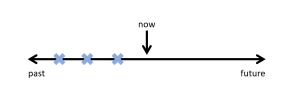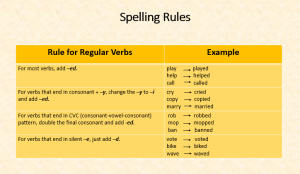9. The Simple Past Tense
Learning Outcomes
After completing Chapter 9, students will know how to:
- use the functions of the Simple Past Tense.
- form the Simple Past Tense in affirmative statements, negative statements and questions.
- apply the Simple Past Tense in various situations.
- use the correct spelling rules for regular verbs in the Simple Past Tense.
Functions of the Simple Past Tense
The Simple Past Tense is used for
- finished past actions.
- repeated past actions.
Let us discuss these points in detail:
Finished past actions:

Actions that started and finished in the time before now. Some examples are:
- I cleaned my house yesterday.
- He played basketball last night.
- They didn’t wash their dishes.
- We didn’t finish our homework in time.
- Did you go to the game on Friday?
Repeated past actions:

Actions that happened over and over again in the past. Some examples are:
- I went to the store 3 times yesterday.
- They played basketball every day in elementary school.
- She watched that movie repeatedly as a child.
**Time Markers for The Simple Past Tense
Some common time markers used with The Simple Past Tense are:
- yesterday
- last night/week/month/year
- ago (2 days ago/5 weeks ago/10 years ago)
Form of The Simple Past Tense
Let us now explore how the Simple Past Tense is formed with regular *verbs:
| Subject + | verb + ed | + past time marker. |
|---|---|---|
| I | cleaned | yesterday. |
| He | played | yesterday. |
| Melissa | danced | yesterday. |
| They | studied** | yesterday. |
* Irregular verbs are all different. You need to memorize the affirmative forms using the list of commonly used verbs in Chapter 18.
| Subject + | did+ | not | + base verb |
|---|---|---|---|
| I | did | not * | clean. |
| He | did | not | play. |
| They | did | not | study. |
* did not = didn’t
| Did + | subject | + base verb? | Short Answer |
|---|---|---|---|
| Did | you | clean? | Yes, I did./No, I didn’t. |
| Did | Noah | play? | Yes, he did./No, he didn’t. |
| Did | they | study | Yes, they did./No, they didn’t. |
| Wh- question word + | did | + subject | base verb? |
|---|---|---|---|
| What | did | you | eat? |
| Where | did | Meghan | go? |
| When | did | they | arrive? |

(For common irregular verb forms, see Chapter 20.)
Simple Past Review of Form and Function Video
Watch the video Simple Past – Grammar & Verb Tenses (5:47 minutes) on YouTube to review the form of Simple Past and some irregular verbs. Do the practice activities at the end of the video!
Video Source: Ellii (formerly ESL Library). (2020, September 14). Simple past – Grammar & verb tenses [Video]. YouTube. https://youtu.be/MI3S3kdkofo
Simple Past Form Practice – Affirmative
Fill in the blanks with the verb in brackets. Remember that some verbs are irregular. See if you can guess the correct form.
Simple past – Recap (Text Version)
Fill in the blanks with simple past tense form of the verb given in the bracket.
- I _______ [Blank 1 – receive] a parcel from my aunt last week.
- The great ship Titanic _______ [Blank 1] (sink) after colliding with an iceberg.
- The little girl _______ [Blank 1 – break] the glass tumbler.
- If he _______ [Blank 1 – play] well, we would not have been defeated.
- The members _______ [Blank 1 – select] him as the captain.
- The shephard _______ [Blank 1 – count] his sheep twice, after he returned home in the evening.
- I _______ [Blank 1 – get] a beautiful gift from my brother.
- Praveen _______ [Blank 1 – keep] his books in the book-shelf.
- The plane _______ [Blank 1 – fly] towards the east after it took off.
- They _______ [Blank 1 – record] the complete wedding.
- The teacher _______ [Blank 1 – appreciate] Youssef for getting good grades.
Check your Answers in footnote[1]
Activity Source: “Simple past – Recap” by Annapurna Madhuri, edited by Sari Martin, from “Simple Past and Past Continuous” In Effective English for Teachers by Annapurna Madhuri, licensed under CC BY-NC SA 4.0. / Converted to text.
Simple Past Form Practice – Negative
Simple past – negative sentences (Text Version)
Rewrite each of the sentences in the negative form, as shown in the example.
Example: Shanti bought a car last year.
Shanti did not buy a car last year.
Note the sentence structure: Subject (Shanti) + did not buy (base verb of bought) + object (a car) + time period (signal word – last year)? (most importantly – question tag)
- Valentina came here three days ago.
- They watched a movie last night.
- David cleaned his house yesterday.
- We worked hard that day.
- She had a bath early in the morning.
Check your Answers in footnote[2]
Activity source: “Simple Past – Negative Sentences” by Annapurna Madhuri, edited by Sari Martin, from “Simple Past” In Effective English for Teachers by Annapurna Madhuri, licensed under CC BY-NC SA 4.0. / Converted to text and minor edits.
Simple Past Form Practice – Interrogative
Simple past – interrogative sentences (Text Version)
Rewrite each of the sentences in the form of a question/interrogative form, as shown in the example.
Example: Pierre bought a car last year.
Did Pierre buy a car last year?
Note the sentence structure: Did + subject (Pierre) + buy (base verb of bought) + object (a car) + time period (signal word – last year)? (most importantly – question tag)
- Valentina came here three days ago.
- They watched a movie last night.
- David cleaned his house yesterday.
- We worked hard that day.
- She had a bath early in the morning.
Check your Answers in footnote[3]
Activity source: “Present Continuous” by Annapurna Madhuri, edited by Sari Martin, from “Simple Past and Past Continuous” In Effective English for Teachers by Annapurna Madhuri, licensed under CC BY-NC SA 4.0. / Questions edited and converted to text.
Simple Past All Forms Review
Simple Past – Wrap up 2 (Text Version)
Arrange the jumbled words, using a suitable form of the verb (Marked with an * to make proper sentences.
Example: you/from/hear/the/new/job/did/?
Answer: Did you hear from the new job?
- Mohammed/*play/toys/did/with/?/his
- *borrow/Alice/sister’s/dress/new/for/party/the/her
- train/leave/did/the/station/?/time/on/the
- examination/lot/Sameer/before/*waste/of/a/time/his
- not/Sofia/grade/receive/good/a/did/
Check your Answers in footnote[4]
Activity source: “Simple Past – Wrap Up 2” by Annapurna Madhuri, edited by Sari Martin, from “Simple Past” In Effective English for Teachers by Annapurna Madhuri, licensed under CC BY-NC SA 4.0. / Questions edited and converted to text.
Pair Work or Small Groups
Ask and answer the following questions in partners or a small group:
- What did you do last night?
- Where did you go after school yesterday?
- Why did you choose this school?
- When did you last go to the dentist?
- How did you get to school today?
- Where did you buy your groceries last week?
- What did you do as a child that made you happy?
- Where did you go on your last vacation?
- What did you watch on TV yesterday?
- What time did you go to bed last night?
- What time did you wake up today?
Communicative Activity – Past Story Chain
-
In a circle or small group, one student starts a story with one sentence in the past:
-
“Yesterday, I woke up late.”
-
-
The next student continues:
-
“Then I missed the bus.”
-
-
Continue the story around the group, building it sentence by sentence.
Variation: Write the story down as a group for a funny recap at the end.

Verb Tenses in Music
For a fun activity, listen to the following songs:
- Because You Loved Me by Celine Dion
- A Day in the Life – The Beatles
Can you hear the Simple Past Tense in the lyrics?

Attribution & References
Except where otherwise noted, “The Simple Past Tense” by Sari Martin & Virginia McHardy is licensed under CC BY-NC-SA 4.0.
-
- received
- sank
- broke
- played
- selected
- counted
- got
- kept
- flew
- recorded
- appreciated
-
- Valentina did not come here three days ago.
- They did not watch a movie last night.
- David did not clean his house yesterday.
- We did not work hard that day.
- She did not have a bath early in the morning.
-
- Did Valentina come here three days ago?
- Did they watch a movie last night?
- Did David clean his house yesterday?
- Did we work hard that day?
- Did she have a bath early in the morning?
-
- Did Mohammed play with his toys?
- Alice borrowed her sister's new dress for the party.
- Did the train leave the station on time?
- Sameer wasted a lot of time before his examination.
- Sofia did not receive a good grade.

